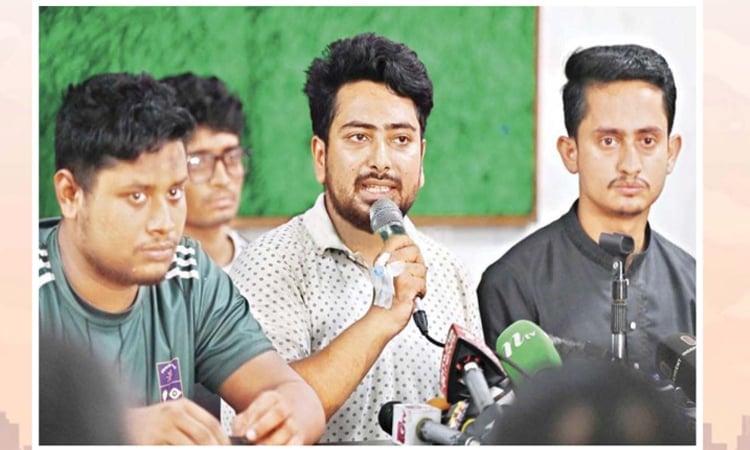News Flash
News Flash

DHAKA, July 24, 2025 (BSS) - The anti-discrimination student movement leaders on July 25 last year declared to continue their movement with placing a series of demands including justice for the killings amid the nationwide mass arrest.
"The movement will not end with the publishing of the gazette notification (on the quota reform). It will continue with a series of demands," Asif Mahmud Shojib Bhuyain, a key coordinator of the quota reform movement, made the announcement on his Facebook account quoting Nahid Islam, another coordinator.
In the post, Asif wrote that Nahid stated that the movement had moved beyond just the quota reform issue.
The demands included justice for the killings and abductions of students and civilians, and damages to the state, withdrawal of false cases, release of innocent arrestees including former DUCSU Social Welfare Secretary Akhtar Hossain, compensation to the families of the people who were killed or injured during the movement and elimination of terrorists politics in all campus and bringing the administrations of universities under trial.
The student leaders also issued an eight-point directive to protesting students. The directives included preparing lists of the killed and injured people, identifying those responsible for violence and killings, putting pressure for reopening the universities and dormitories, helping the hospitalized people, visiting graves of the martyrs including Rangpur's Abu Sayeed, praying for their souls and expressing condolences to families.
They came up with the announcement as their 24-hour ultimatum ended on the day for their four-point demands issued on July 23.
Besides, another faction of the movement released a statement quoting coordinator Hannan Masud that they would observe different programmes, including offering prayers and holding mourning processions across the country after Jumuah prayers next day on July 25.
Meanwhile, students from private universities also announced a peaceful nationwide programme titled "remove all criminals from the state system" on July 25. They also declared to offer prayers for the martyrs in the quota reform movement at all worships across the country and hold peaceful protests to draw attention of all constitutional institutions.
However, the law enforcers were continuing their 'combing operation' to arrest the people over the violence activities that took place across the country centering the anti-discrimination student movement that started on July 1 demanding quota reform in government jobs.
According to a Bangla daily- Dainik Inqilab- at least 5,000 people were arrested across the country between July 17 and 25. Among them, 2,209 were arrested in the capital Dhaka, 735 in Chattogram, 153 in Narsingdi, 128 in Sylhet and 102 in Barishal.
On July 25, 451 people were shown arrested in 128 cases filed nationwide. In Dhaka alone, 201 cases were filed with different police stations regarding vandalism, violence and sabotage targeting government installations.
About the mass arrest, Sarjis Alam, a key coordinator of the movement, claimed that the cases were politically motivated to suppress the movement.
According to another Bangla daily- Dainik Samakal- three more injured protesters died while undergoing treatment, raising the total death toll to 203 since July 16.
Besides, by July 25, Dhaka Medical College Hospital (DMCH) morgue had completed autopsies of 85 bodies and handed them over to their families. Besides, eight unidentified bodies were given to the volunteer organization Anjuman Mufidul Islam for burial after autopsies.
On the same day, Amnesty International, in a report, alleged that police used lethal weapons to suppress the movement.
Besides, at a regular press briefing at the United Nations (UN) on July 25, UN Secretary General's spokesperson Stephane Dujarric called for conducting a "transparent and credible" investigation into the violence activities that took place in Bangladesh centering the quota reform protest.
BNP Secretary General Mirza Fakhrul Islam Alamgir in a statement also called for an international investigation into the incidents and casualties during the quota reform protests.
President of the Supreme Court Bar Association and advisor to the BNP Chairperson Barrister AM Mahbub Uddin Khokon called for the immediate withdrawal of the curfew and urged the authorities not to arrest political activists and lawyers indiscriminately until the real perpetrators behind the destruction of public and private property are identified.
However, as the situation was improving across the country with the curfew in effect for the sixth consecutive day, it was relaxed from 8am to 5pm on July 25 while government and private offices remained open for four hours.
Besides, deposed home minister Asaduzzaman Khan Kamal said that the curfew would remain in force in Dhaka, Narayanganj, Narsingdi and Gazipur on July 26 and 27.
Compared to previous days, there was significantly higher passenger presence in long-distance bus counters and the launch terminal in the city. During the relaxed hours of the curfew, the Bangladesh Inland Water Transport Authority (BIWTA) allowed the resumption of limited ferry services.
Despite the overall situation improving, the capital witnessed a heavy military patrolling across the city. Law enforcers were on high alert.
However, the government on July 25 postponed HSC and equivalent exams scheduled for July 28, 29, 31, and August 1. Earlier, exams scheduled for July 18, 21, 23 and 25 were also deferred by the Inter-Education Board, citing student safety concerns.
Earlier in the morning on July 25, toppled Prime Minister Sheikh Hasina visited the damaged Mirpur 10 Metrorail Station in the city where she called upon the countrymen to resist the anarchists who went on rampage for multiple days since July 17.